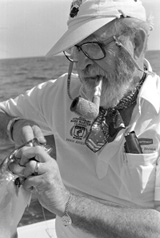
NBT Interview: Fishing Guru Bill Burton
The Old Man of Chesapeake's
"Sea"
with Bill Lambrecht and Sandra O. Martin
For catching a fish or spinning a fish story, you couldn't find a better man than Bill Burton. He's traded in both for a half century, learning like the back of his hand woods, waters and wetlands from Alaska to Cuba.
For 42 of those years, Burton's covered Chesapeake Country -- so thoroughly that he was named an Admiral of the Chesapeake by Gov. J. Millard Tawes. Burton ranks as Maryland's premier outdoorsman and -- for his work in newspapers, magazines, television and radio on the side -- its dean of outdoors reporting. Thirty-seven and a half of those years, he'll tell you proudly, he spent as outdoors editor for the Baltimore Evening Sun, "the best job in the world."
Retiring at a vital 65, Burton joined fledgling New Bay Times in our fifth issue, bringing us a strength and sagacity envied by papers many times our age.
Of course for a man of Burton's range, a single job is as hard to settle down to as a single wife (of wives, he's had five). He's since joined the Annapolis Capital and Maryland Gazette as outdoors columnist and added a stack of newsletters and television gigs to his resume -- which, now that he's 71, doubles as the fact sheet for his obituary. And that's the short of it; Burton continues as associate editor of Fishing and Hunting Journal, editor and partner of the annual Maryland Deer Hunting Guide and, as he's been for 40 years, editor of the annual Fishing in Maryland. Oh, and don't forget the Hunting Report and the Angling Report. On the side, he teaches fishing (and has taught journalism) at Anne Arundel Community College and Chesapeake College. He's also an active president -- and one of three founding members -- of Mason-Dixon Outdoor Writers' Association.
When Bill Burton's not out fishing, he's a family man, devoted to his six children, nine grandchildren, three sisters, one brother, beloved aunt Mimi and two cats, O.J. and the adored Frieda Lawrence. And, of course, Lois, his wife of 31 years.
But come September 27, Burton will be out fishing, leading the fleet out of Harrison's Tilghman Island Inn onto Chesapeake Bay on New Bay Times' Third Annual "Forget Football; Go Fishing" Trip. You -- if you've got any fish sense -- will be along.
Q I was out there fishing this morning, chumming. All the other boats were catching fish but me. What do you say to guys who can't catch fish?
AWere there boats on both sides of you catching fish and in front and behind of you? You don't just go out and put out a chum line. Your chum line has to be where it attracts the fish. You have to find the fish and then you work that.
How long were you fishing? About an hour? [Deep, throaty laughter.] You're a tourist.
Sure, there is an element of luck in fishing, being at the right place, at the right time when fish are hungry. But skill also plays a vital and possibly more important role. It is often the deciding factor in whether fish are caught. The knowledgeable angler knows what to do when he's lucky enough to come upon obliging fish at the right place and the right time.
Fishing is like everything else in life. The fisherman who pursues his sport on the bad days as well as the good days, goes out early, stays late, fishes hard, studies his game plan and works at it is the fisherman more apt to succeed. This I stress with my fishing courses.
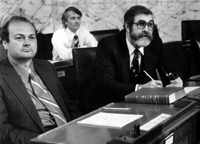
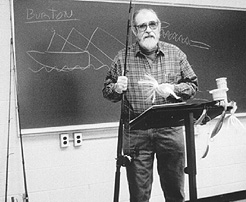
Burton's career as a professional journalist and outdoorsman has led him into the movies, where he played a U.S. senator and into the classroom.
Q I heard you say once that's why they call it fishing rather than catching.
AYep. That's why they do.
QFor most of your 50 years in journalism, you've covered the out of doors. Why did you switch over from assignment reporting?
A [More laughter.] Given the choice, what would you have done?
I'd lived in the country as a kid. When I got discharged from the Navy Seabees, where I'd worked at underwater demolition in the Pacific Theater, I was told I'd have to have a sedentary job all my life. I didn't believe them and wanted to build myself up.
I went home to Harlington, Vermont to recuperate and hunted and fished intensively.
Then I went to college, Goddard College, on the G.I. bill and took journalism. My second semester I was made editor of the paper. My third semester, they opened a radio station in Montpelier, and as a disabled veteran, you could go to work as well as school and they paid you full time as a journeyman in whatever field you took. In a year I was a full-fledged journalist. After a couple years, I switched to newspapers.
I had a bunch of outdoors notes people had sent that I put together in a column, "Outdoor Trails and Tales," and I wrote that periodically. Outdoors writing was not big in the country at the time, but wherever I was, I wrote an outdoors column as an extra, until in 1956 The Sun hired me as its outdoors reporter. I've been a full-time outdoors reporter for 42 years.
Q Journalism has changed a lot over the years, and not all for the good.
A A lot of it's not all for the good. I go down to the Royal Farms at 10 on Saturday morning and see final on top of my Sunday paper. It's the same paper I get at my house the next morning. They're dumping in all these feature stories, so it's not a fresh paper. So rather than beating television where they could beat them by coming up with something new and fresh, newspapers are not doing it.
A couple of weeks ago, there was a big fire in Pasadena, about 8 in the evening, with a major, major traffic tie up. And we didn't see that in the paper the next day; they didn't even cover it. Now the papers don't cover events because people see them on television. Now they close the paper early, and that whole audience, why they're just passing it along to radio and television.
It used to be great. Even the ball scores: every time the paper went to press so they could stop it, they had an update: the scores and a line or two on the innings. There was an excitement to it, so people could follow it. Today, a newspaper doesn't even mention there was a game in progress when they went to bed.
Today it's all determined by convenience, though they've got all the technology in the world.
I don't care what television does. We can still beat them, because we can be there, but we just hand them the whole thing.
If Jesus Christ came, they'd bitch about it: 'We've been a week setting this page up and now we've got to make room for him. Why does he want to do it on Saturday night?'
That's why the Sunday paper sucks. It's packaged; it's safe.
Of course we had competition. If we had two papers in Baltimore - or if they had a stronger second paper in Washington - you better believe they'd have late-breaking stuff. It bothers me.
Q You covered everything there was to cover. Politics
A I didn't like covering politics. It wasn't a good job for a family person. I covered Eisenhower's nomination for the Bennington, Vt., Banner and covered the Stevenson campaign train in New England and New York.
That was really work. You know you might travel more miles in a plane, but when you were on a train, there was never any rest because there was always the drinking and partying, which was part of it. Seriously. There was hard news to get and you always worried whether your stories got through. You weren't working on a computer where you could punch a modem. You were writing copy, going to whistle stops, handing copy to someone and hoping it got through. It just didn't hit me as what I wanted to do.
Q What else did you cover?
A Crime. I remember the first murder I ever covered was the first Massachusetts state trooper ever killed - murdered - in the line of duty. Shot. His name was Alje J. Savella. He was killed maybe 70 miles from Springfield, Mass., in a little town called Athol. I was working for the Springfield paper, the Union, and had to go there. It was quite a story. Back then, we got three cents a mile for traveling, and they were deliberating whether I was going to stay there and do more of a story or pick it up by phone after the impact settled. So I'm there and they're trying to make a decision.
They finally said, all right, you stay there a day or two. And I'm there, with all the people from the Boston Post, which was then the big crime paper, the Globe, the Herald, the Boston American, all kinds of papers, and I get up and buy the papers and I couldn't believe all the stories I was reading. Drugs. Prostitution. Here I was covering it. I used to look at that and say geez
That was the old times, bidding for circulation. The crime reporters in those days, they'd go to a press conference and from what you'd read you'd see they'd make up their own stories. Different.
Q Speaking of making up stories, didn't you tell me once that you only got one assignment at The Sun?
A Yup, in all the years I was there, 37 and a half, only one. It was on fox hunting.
I also had a column pulled once. It was on the Inner Harbor in Baltimore. It used to be a green park. I wrote a farewell column the day before the vote [authorizing the construction]. It ran in a couple of editions, and then they pulled it after the publisher saw it. They took it out.
Q How come you decided to retire from The Sun at a pretty young age?
A I was 65. I didn't want to retire, but my wife and kids kept saying I should. I had had open-heart surgery and decided it was time to slow down, which I never got around to.
But again, I saw the handwriting on the wall. You weren't going to get space. The outdoors had lost a lot of its favor. Not with readers, but to professional sports. Basketball had become much bigger.
It's probably a good thing I did because I would have died. I look at the space they give to the outdoors today and what they allow to be done. I couldn't have lived under those conditions.
When I was there, the last couple of years I just went off and did whatever I thought had to be done. I didn't have to check it out, unless I was going away for a couple of weeks. Generally, you just went and did it.
Q And in all that time you never missed a deadline?
A The only time I ever missed a deadline in my life was because of drinks that tasted too good.
I had a column due for The Sun, and I just couldn't produce. I'd had to go to a Saturday wedding in Crisfield, at 9am. So I drove to Crisfield with my notes for the column. I figured I would write it about 2 in the afternoon.
Then for the Sunday paper you could get your column in as late as 6 or 7 Saturday night. And that was back in the days before everything was fast. That was on the typewriter, and somebody else had to set it. Today you write it and push a button.
But there was a champagne breakfast, and the champagne tasted good. I drank a lot in my day, but never champagne, and the next thing I knew, I was out. I sat down for a few minutes and woke up, and it was 8 in the evening. I'd missed my deadline.
Q What did you cover on the outdoors beat?
A I've done hunting, fishing, boating, camping, conservation and the environment, from Alaska, across Canada, Mexico and across the United States, with Chesapeake Bay as main focus. I've fished from the mouth of the Bay to the dam at the Susquehanna River, plus all the tributaries. I've hunted or fished in all 50 states plus all the territories and provinces of Canada, and in Cuba and Mexico. At least 20 times, I've flown across Canada with the U.S. Fish and Wildlife Service and Ducks Unlimited reporting on waterfowl habitat and problems.
Q In all those years, have you seen patterns of decline and resurgence on Chesapeake Bay?
A I've seen patterns, sometimes, of resurgence - with rockfish as a chief resurgence. But I also see it slip back. Over the long haul, I've seen more slipping back than sliding ahead. There's a troubling aspect to all of this. I think the people who manage and administer the Bay might be overly optimistic. I hope they're right, but I have a few nagging doubts. This is not to blame problems on Department of Natural Resources, but administrations and legislatures keep trying to get more out without putting much into it.
So I wouldn't disagree with this month's Chesapeake Bay Foundation report that shows a long, long way to go on most of 12 indices.
Q What is it about fishing that is so alluring? I once heard that fishing's good for the soul whether you catch anything or not.
A I think of Herbert Hoover, who said all men are equal before fish. It doesn't make any difference to them whether a president catches them or Huckleberry Finn. It is a challenge, but it isn't a must-win challenge. It doesn't have to be a contest. You're just out trying to catch a fish. You want to catch it, and some species you're going to put back. Not because they don't taste good but for conservation reasons. Other fish you keep. It's just the fun of doing it and the actual feel of it. Just to feel that fish, the vitality of it.
It's like surf fishing is one of the greatest sports in the world because you're standing out in water and you're feeling the force of the surf.
Q How many presidents have you fished with?
A Two. Eisenhower and Bush. Both were avid fishermen. That doesn't mean they were expert, though Bush knew what he was doing. Ike, I guess you'd say he knew what he was doing too, though he didn't take his fishing as seriously as Bush.
George Bush thought like a fish. He'd look at things and know what would be there and figure where to cast.
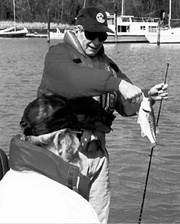 Then
President George Bush, a man who knows his fishing, turned to Bill Burton
for expert guidance when fishing Chesapeake Country.
Then
President George Bush, a man who knows his fishing, turned to Bill Burton
for expert guidance when fishing Chesapeake Country.
Q Where did you fish with Bush?
A We fished for bass on the Potomac River near the Woodrow Wilson Bridge. We each caught one. The day was freezing, the wind was blowing 30 to 35 miles an hour. It was a very uncomfortable day. I told him in the morning it would be bad, but he said 'no, I want to fish.'
But his big complaint was this. He was an early riser and so was his wife, Barbara. That morning she got up before he did. He got up around 5am and had laid out his long winter underwear. When she came in from walking their dog, he asked her if it was cold, and she said no. Of course outside the White House, it's protected from the wind. So he didn't wear his longjohns.
Well, it is when you're out on a place like the Potomac. When we started, it was cold enough so that the ice on the lines froze the guides on the rods. So we were kidding how he shouldn't have listened to his wife.
Of course we couldn't go anywhere else because the Secret Service wanted to know where we were going to fish so they could check the area.
Q Where'd you fish with Eisenhower?
A On a stream outside Gettysburg. We went with the chairman of the board of the Sunpapers at the time. We caught trout. I got one or two and the president got a couple, and my boss, Harry Black, he got a couple. It wasn't great fishing, but Eisenhower liked to fish.
Q If Bill Clinton called you up and said he wanted to go fishing, would you go with him?
A I probably wouldn't go, but I think more of the office than to say no point blank. I haven't seen him tied in with any fishing. I guess he's a waterfowl shooter.
Clinton seems more like an organization man; they would set everything out ahead of him. I know from the time when he was shooting mallards in Dorchester County, they had the whole thing all set up for him, and he was going to shoot a bird or two and then get out of there.
Fishing with Bush, he was an active participant. That's the fun of it. That's what he was doing in Maine on his bluefishing trips. He looked at places and evaluated them, and the Secret Service would tell him whether or not he could go there. He was a fisherman and knew what he was doing.
I don't think it would be that way with President Clinton.
Q Would you give President Clinton any advice on women?
A I don't think he needs that kind of advice. I would tell him to wait until he gets out of the presidency.
Q Besides presidents, who else have you fished with whose name we'd know?
A Lots of politicians: Sen. Barbara Mikulski, Comptroller Louis Goldstein, Governors Marvin Mandel, Ted McKeldin, Millard Tawes - the only one I missed from those years was Spiro Agnew, who had an appointment but didn't show up. He played golf instead.
And sportsmen: Weeb Eubank, coach of the Baltimore Colts in their heyday and Colts players Johnny Unitas, Billy Ray Smith, Steve Stonebreaker and Freddy Miller. From baseball, Boog Powell, from the Orioles; Ted Williams, from the Boston Red Sox and announcer Bob Euker.
Fishing with Bill Burton, U.S. Sen. Barbara
Mikulski has caught fish rivaling her in size though not political stature.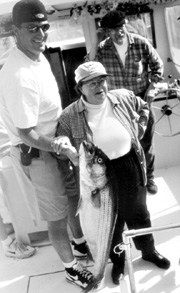
Q You fished with Ernest Hemingway, too, didn't you?
A At the Hemingway Fishing Tournament, 1955. Hemingway was the hero in Cuba. So he had fishing tournaments - always for billfish, white marlin - he would fish in them and present the prizes. They were quite the affair, the type you would associate with him: drinking. Mostly rum drinks.
Q You've had so many good days on the water. Are there any days that just jump out at you?
A I've had some days on the Bay when we've caught 150, 200 rockfish. This is in recent years, fishing with Captain Ed Darwin out of Annapolis. Last month, we were fishing. On the radio, boats were saying if you didn't troll, you wouldn't catch any fish, or you had to fish deep.
We got out on the Bay at 7:15am and set anchor. There were five of us. At 8:20 we had our limit of rockfish, and we probably had 10 or 12 more that we could have kept. In that day alone, we probably caught 50 or 60 rockfish, plus all the big white perch and things like that. There are many, many days that good.
QOf course, you've fished far more than the Bay.
A The first day that jumped out was on the Brooks River Range in Alaska. I was living in Anchorage, covering one of the fishing package plans set up by an airline. 'Course it got daylight at 2 in the morning, and I was used to fishing in Vermont - and there's some pretty good fishing there, on the Battenkill River. But we were here on Brooks River, so I got up about 1:30am because the sun came up at 2am and I went out on the river, and I stayed until 10 that night without leaving to eat or anything because I was afraid I was dreaming and I didn't want to wake up.
We were catching - the smallest rainbow trout was 17 inches, and I was out in the middle of them. We saw the grizzly bears chasing salmon walk by us and I knew I was asleep, dreaming. That was probably the best day I ever had fishing. There were sea-run rainbow trout, steelheads. The biggest was five or six pounds.
Q Being in Nirvana up there for hunting and fishing, why did you leave Alaska for Nebraska?
A I went to Plattsmouth, Nebraska to run a paper. Alaska was fun in the summertime, but in the winter, I'll tell you. There was nothing to do in the evening. The library was very small, the movies were months and months late. There was no social life other than drinking, a lot of drinking. You'd write and then you'd go down to one of the saloons and sit around. We were young and everybody was adventuresome, so we'd drink. We had our first child coming at the time, and I was away an awful lot, flying all over the territory to do stories. I decided it just wasn't the way to live. Reluctantly, I left, expecting to go back sometime. But it was great. You'd look out and see a moose in the backyard.
Q You've got a great wide-angle view of fishing from Alaska to Mexico, from bass fishing to trout fishing to ocean fishing to Bay fishing. What's good about the Chesapeake Bay?
A This year it's really a world-class fishery. World-class means super, full of big fish.
It's a funny thing. When I came here in 1956, you'd go out this time of year - though a lot of people didn't fish much after Labor Day, which was something I couldn't understand. In the upper Bay or the mouth of the Potomac, as far as you could see, you'd see breaking fish. But many of those fish were eight, nine, 10, 11, 12 inches.
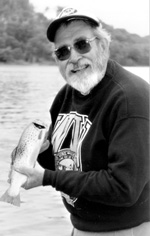 Now we're seeing nearly
as many fish, but they're 12 to 15 inches. Many of them are 18 inches, which
is the minimum, and many go bigger. These are quality fish, where before
many of the fish had to go back even though the minimum size was, over the
years, 11 or 12 inches. And back then you very rarely got bluefish.
Now we're seeing nearly
as many fish, but they're 12 to 15 inches. Many of them are 18 inches, which
is the minimum, and many go bigger. These are quality fish, where before
many of the fish had to go back even though the minimum size was, over the
years, 11 or 12 inches. And back then you very rarely got bluefish.
The Bay is exciting also in that there are so many different ways that you can catch fish. You can jig for them, and I think jigging is the most exciting. And we've got chumming, or you can drift crabs or live eels. You can use artificals. You can see fish breaking on the surface and go out and cast to them. That's what George Bush liked to do, he liked to chase the bluefish and cast to them, and that is very exciting.
But there are concerns for the future of all of this
Burton at Deep Creek Lake.
Q You were one of the first to write about the menhaden problem.
A Yes, I was. You know, it's like the story of the blind men and the elephant. You're in an area, and you figure everything is just what it is there. I've been in all the different areas, and I've seen this incredible pressure on menhaden. I saw it on herring, I saw it on shad. When you get incredible pressure, oftentimes you deplete the stocks.
As the cod, the pollock, the hake, all of the fish in the North Atlantic, as those fish go - and they've got moratoriums, areas closed off to fishing all through that region - these fishermen have boats, and the only way they keep their boat is to make the payments. And the only way to make the payments is to rig for something else. So everybody is rigging for anything. And one of the things they can still go and make some money on menhaden, so everybody's rigging for menhaden.
Menhaden used to bring awful prices. At one time, they were mostly used for fertilizer and a lot of boats didn't go for them. Now we've got a hungry world; they want anything, and menhaden are bringing better prices.
The menhaden just can't take that pressure. Much of the thinking is, we really don't have any trouble. But we do. I've talked to state authorities, and they say it's just going to take time to catch up.
The same thing goes for the sea herring fishery.
Q Do you buy into that as one of the reasons rockfish are thinner this year?
A It could well be an association, but I just hate to say that. We're having a bad crab year, and everybody in the commercial element is saying, 'the rockfish are eating the crabs; you can't have a lot of crabs when you've got a lot of rockfish.'
It's the same thing every time we've talked about fewer crabs, especially during the rockfish moratorium. Well, damn it, it primarily isn't a question of rockfish eating crabs. Crabs aren't a significant part of the rockfish diet. Menhaden are. But what better way to get the rockfishery opened up than to say the rockfish are eating all of the crabs?
Some people are saying the same thing about white perch: the rockfish are eating all the white perch, so we're going to have this crash in the white perch fishery. It didn't happen. White perch fishing is absolutely the best that I have ever seen anywhere. It beats the white perch fishing in Maine, where there's great white perch fishing.
Just a country boy at heart.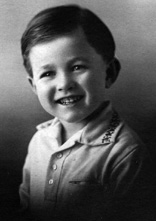
Q What's the best tasting fish?
A I always say, you go to an Eastern Shore fish fry and they all eat the white perch first. But I like rockfish.
Q How do you like it cooked?
A I like to see it fried, browned and fairly crisp but still moist where the flesh is still white. But my doctor doesn't like it. So I eat it broiled with just a slice of onion on it.
I like a firm-fleshed fish. The seatrout is not as firm. The hardhead is not as firm. But bluefish when smoked is just delicious.
Q You've caught them, cleaned them, cooked them and eaten them. Is there anything you haven't done? What's still on your menu?
A I just want to be around when shad fishing returns. I like the fishing and the eating of shad, especially shad roe. Shad is delicious fish but the bones are the problem. It's one of the things I've tried to master, but in all of my years, I still can't bone a shad up to my expectations.
I want to see the year 2000 because when I was a young boy, my mother promised me I would. If I make it to 2000 and catch shad, I'll be quite fulfilled.
And, of course, I have to stay around to write the obituary of my cat, Frieda Lawrence.
Your Invitation from the Master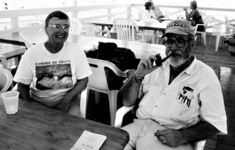
Resting and exchanging fish stories after last years Bill Burton/New Bay Times fishing trip.
Let's go fishing. Consider this your personal invitation to join this writer and other staff members of New Bay Times along with several dozen other readers on our annual fishing trip Sept. 27 at Tilghman Island.
We have selected what we consider the peak of chumming for both blues and rock. The past couple years we selected comparable dates, and we were busy catching fish.
We should do even better this year; fishing during the spring trophy season, then during the early summer season that closed July 12 was the best in my memory - and I've fished the Chesapeake and its tributaries regularly since 1956.
There's no better opportunity to cash in on this bonanza of fish than to join us at Harrison's Chesapeake House at Tilghman Island. You don't have to be a bonafide angler to participate; we have a fleet of charterboats lined up for our party.
Skilled captains and mates will be on hand to help in luring and reeling
in the bounty of the Bay. In our past outings, there have been anglers who
caught the first big striper of their lives; many others who told us they
never caught more.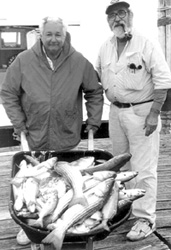
Capt. Andy Scheible and Burton with a late-September catch from the mouth of the Potomac.
The purpose of our junket is several-fold. We want you to get out on the Chesapeake to better appreciate what we have on its waters. We also like to catch fish -- and know there are countless others who do likewise, but never have the opportunity.
Also, this annual occasion originated as our protest against the spending of more than $140 million to build a football stadium in Baltimore when funding was needed for Bay restoration, libraries, improved law enforcement, schools and many other more worthwhile and much needed projects.
We polled our readers as the stadium project controversy raged, and more than eight out of ten readers turned thumbs down on a publicly financed stadium for a rich owner and his multi-million dollar franchise. They voted by the hundreds, and some suggested we might show our objections by going fishing on a Sunday, the day when most National Football Leagues games are scheduled.
We're always on the lookout for an opportunity to go out on the Bay and catch some fish, so we took the bait and scheduled our first trip two years ago. We caught an awful lot of fish. Most took their rockfish limits early, then caught blues, sea trout and flounder.
Last year, despite brisk winds, we did even better, and this year we should top the '97 catch. Chesapeake and rockfish restoration efforts didn't get funding of the magnitude that would have been possible with $140 million plus that was diverted to the stadium, but the Bay is a tough old gal, so are rockfish, and together they make that world-class fishery.
Want to fish? The fleet goes out at 7am Sun. Sept. 27. The cost for fishing and three meals (dinner Sat. or Sun., early breakfast Sun. and box lunch) is $100. Now's the time to call or write New Bay Times, P.O. Box 358, 5861 Deale-Churchton Rd., Deale, Md. 20751 410/867-0304
| Back to Archives |
VolumeVI Number 37
September 17-23, 1998
New Bay Times
| Homepage |